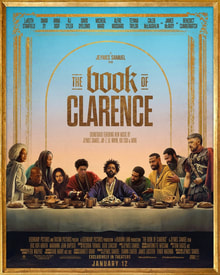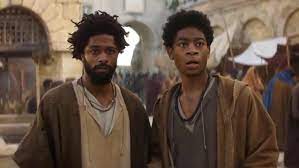|
“The Book of Clarence” stars LaKeith Stanfield, Omar Sy, Anna Diop, RJ Cyler, David Oyelowo, Michael Ward, Alfre Woodard, Teyana Taylor, Caleb McLaughlin, James McAvoy, and Benedict Cumberbatch. Released on January 12, 2024, the film has a struggling man claiming himself as a new Messiah. The film was written and directed by Jeymes Samuel, best known for directing “The Harder They Fall”. Everyone knows the story about Jesus Christ and how his legend and good deeds brought joy and goodwill to his people. But what they didn’t know about the story is that one of his people strived to copy off his religious success. This brings us to the latest feature film from singer-turned-filmmaker Jeymes Samuel, aka “The Bullitts”, which takes a modern approach to the biblical tale. Of course, by that, I mean the one with an African-American cast and an R&B soundtrack. Nothing screams “religion” more than a dose of diversity and modern music. Usually, I don’t watch many religious-inspired movies, but this film is one of the few exceptions that immediately grabbed my attention with its marketing and early positive reviews. Was this “hip and cool” biblical epic able to meet or exceed those expectations? Let’s find out. The story, told in three “Books”, follows Clarence (Stanfield), a down-on-his-luck black man in A.D. 33 Jerusalem. Clarence and his friend Elijah (Cyler) struggle to provide for his family and earn enough money to pay off the loan shark Jedediah the Terrible (Eric Kofi-Abrefa). Even worse, he’s constantly being racially profiled by Roman soldiers. After smoking opium one day, Clarence conjures up the idea of becoming a messiah to free himself of debt, capitalizing on what he thought was the success of Jesus Christ. However, he must accomplish a series of tasks to become the 13th apostle, leading him on a biblical adventure that could help him gain his faith in God. As I said earlier, I haven’t watched much religious-themed content, save for “VeggieTales”, mainly due to their quality. The last time I viewed one was “Samson” a few years ago. Long story short, it was something I’ll remember for the wrong reasons. It’s also because these movies can be pretty tricky to pull off without rubbing specific people the wrong way, whether they’re making or reviewing them. So, it was best to hold off on talking about them until I could figure out how to correct these conversations. This was before I found out about “The Book of Clarence” and its attempt at providing a modern spin on the traditional biblical epic genre inspired by “The Ten Commandments” and “Ben-Hur”. That was one reason I became interested in this movie, the other being my appreciation of Jeymes Samuel’s unique vision and soundtrack in “The Harder They Fall”. Based on my experience with “The Harder They Fall” and the marketing for “Book of Clarence”, I had no doubt I was hoping for this movie to provide the same refreshing and energetic flavor to its traditional narrative. That is until I saw the final product, which has plenty of ambition in its story and messages but lacks the flair and pizazz to live up to its unique concept. “The Book of Clarence” is pretty much like “Hamilton” in biblical form. It’s a fine enough direction that showcases how people from different cultures see God or Jesus. However, what matters to me is the execution of that direction story-wise and quality-wise, as I don’t care much about accuracy unless necessary as part of the storyline. Regarding the narrative Samuel wanted to tell, “The Book of Clarence” had some of its religious features that’ll likely resonate with specific audiences. However, everything else will probably depend on your expectations. The marketing for this film depicted a fun, humorous, and energetic fictional reflection of Jesus’s life from a nobody’s perspective. However, the final cut is more like a biblical drama depicting the questions surrounding faith with some comical bits that almost resemble it as a parody. The film showcases Clarence’s attempts to become a messiah, but it’s mainly about his internal struggle involving his faith and his unexpected quest to become the best person he can be. That journey led Clarence to learn the true importance of faith. “The Book of Clarence” was admirable in delivering this thought-provoking message that’ll likely start some conversations. Sadly, the film struggled to strike the perfect balance in its tone and emotion to make its plot more impactful. This is due to Samuel’s screenplay, which had a few funny pieces of dialogue that stood out, but they weren't enough to cover up its rushed and underwhelming character arcs, especially Clarence. Another reason is Samuel’s direction, which had enough style to cover up his flawed storytelling. As I mentioned earlier, I enjoyed his stylistic vision in “The Harder They Fall”, so I was curious and excited to see how it would play out in a biblical-type movie. After watching it, I realized I should’ve kept my excitement in check. It’s not that I don’t like his presentation, as it had plenty of serviceable stylish choices that made the film visually appealing, even though it occasionally resembles a two-hour music video. It’s the fact that it didn’t have the energetic vibe that made Samuel’s previous movie an entertaining ride. It also doesn’t help that its pacing made the film more challenging to endure than understanding religious beliefs. Of course, that could’ve been my fault for expecting a lot from its marketing and what Samuel introduced in “The Harder They Fall”. Samuel’s visual presentation would likely satisfy those familiar with his musical works, but to me, it’s a bit of a downgrade from his directorial debut regarding his handling of the movie’s concept and uneven tone. Along with its style, the movie made decent use of the cast’s talents to overcome its disbelief. Since my first exposure to him in “Sorry to Bother You,” LaKeith Stanfield has impressed me with his suitable acting skills despite his weak box office draw, especially as the main lead. His performance as Clarence is no different, as he provided enough charisma and heart into an unlucky man trying to be a "somebody". Stanfield also plays Clarence’s twin brother, Thomas, one of the twelve apostles. Omar Sy was also decent as Barabbas, and RJ Cyler offered enough moments to be enjoyable in his role of Elijah. It’s still nice to see Cyler continuing to find more work following 2017’s “Power Rangers”. Alfre Woodard appears in the film, but only briefly, and all I can say about her is that she’s one of the best parts of the movie. Overall, “The Book of Clarence” is a biblical tale that’s ambitious in its presentation and message but lacks the “epicness” in the storytelling and energy to earn its faith from the cinema gods. This is another movie that may have been overshadowed by its misleading marketing and struggled to compensate for it with its dramatic approach. If I had seen it without watching the trailers, I might’ve liked it more than I do now, but not by much. From a critical perspective, the film is one of the most tolerable faith-based movies I’ve seen, mainly due to its cast and Samuel’s visually appealing presentation. However, its admirable faith isn’t enough to block out the nonbelievers regarding its average screenplay, uneven pacing, and hit-and-miss handling of its concept. It’s far from something that deserves to be smitten by God, but it is one of the many occasions where the idea works better on paper than on the screen. If you like biblical epics and the cast it provided, I would say it’s worth watching at home. C
0 Comments
Leave a Reply. |
Home of the most friendly movie reviews on the planet.
Categories
All
Follow Me |
- Home
- Classic Reviews
- 2015 Reviews
- 2016 Reviews
- 2017 Reviews
- 2018 Reviews
- 2019 Reviews
- 2020 Reviews
- 2021 Reviews
- 2022 Reviews
- 2023 Reviews
- 2024 Reviews
- Movie Talk
-
Fan Fictions
-
Ed, Edd n Eddy: The Ultimate Ed-Chronicles
>
-
The 'Beginnings' Saga
>
- Ed, Edd n Eddy: The Rise of Maleficent >
- Transformers: Legend of the Black Cauldron >
- Ed, Edd n Eddy meets the Penguins of Madagascar >
- The Eds and Iron Man: Dawn of the Blowhole >
- Ed, Edd n Eddy: The Fast and the Furious >
- The Eds and Kung Fu Panda: Battle for China >
- Ed, Edd n Eddy and the Lion King: The Full Circle >
- Ed, Edd n Eddy meets Thumbelina: Revenge of the Shredder >
- Ed, Edd n Eddy: Journey to Neverland >
- Ed, Edd n Eddy: All Tangled Up >
- Ed, Edd n Eddy's Frozen Adventure >
- Ed, Edd n Eddy's Edventures in San Fransokyo
- Ed, Edd n Eddy: Return to Neverland
- Ed, Edd n Eddy vs The League of Evil
-
The 'Avengers' Saga
>
- The Eds and the Little Mermaid: Age of Extinction
- Ed, Edd n Eddy meets the Ghostbusters
- Ed, Edd n Eddy: A Sea of Adventure
- Ed, Edd n Eddy meets Anastasia
- Ed, Edd n Eddy in Who Framed Roger Rabbit?
- Ed, Edd n Eddy meets the Incredibles
- Ed, Edd n Eddy and the Lion King 2: Simba's Pride
- Ed, Edd n Eddy: Brand New Zootopia
- Ed, Edd n Eddy: Into the Sugar Rush
- Ed, Edd n Eddy and the Big Sea Quest
- Ed, Edd n Eddy: Heroes Assemble
- Fastformers: Rio Heist
- The Loud Ghostbusters >
-
The 'Beginnings' Saga
>
-
Ed, Edd n Eddy: The Ultimate Ed-Chronicles
>
- Contact
- About


